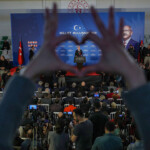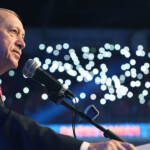As we approach what is seen as an existential referendum “the Chief”—a nickname for Erdoğan—there is a growing consensus among intellectuals who oppose him that he is nearly finished. As with any rule that is shaped by an autocoup, the biggest threat to its resistance may be found within, in the form of emotional wishful thinking. In Turkey’s case, the risks that come with illusion are huge.
Are we living the beginning of the end of Erdogan era? It may be too early to tell. First of all, one week equals a year in Turkish politics; the picture crystallizes just days before the elections. Despite the grand setbacks of the economic crisis and the massive trauma of the earthquake, Erdoğan feels he still has time. He has been here before, and in the two decades of his rule has memorized the basics of Turkish politics: decoded the “political algorithms” of Ankara, and taken nearly full control over state institutions. And we know that he will do his utmost this time not to lose power. He will not go quietly.
So, the euphoria spread by the opposition may be misleading. There are reasons to be utterly cautious. Nearly 90% of the pollsters in Turkey are untrustworthy, lacking transparency and inspection; some of them even operate without a proper internet site. They serve as the machinery of mass manipulations in favor of the ruling party or of the opposition.
Credible pollsters like Metropoll, of which there are only ahandful, show a slight lead for Kılıçdaroğlu by 3-5 percentage points. The most recent data by three others, KONDA, TEAM, and Panorama, show either a slight lead for the ruling coalition (the “People’s Alliance”), or a neck-and-neck race. This should cause alarm for opposition optimists.
That the pro-Kurdish HDP party endorsed Kılıçdaroğlu may seem like a game-changer, but it may not be helpful for the centrist six-party block to gain a strong majority in parliament.
And we now know that there will be two more contenders in the presidential race, secular-nationalist Muharrem İnce and ultra-nationalist Sinan Oğan. This means that the presidential race is likely to go to the second round. This may be what Erdoğan’s winning strategy is being built on: if the AKP and MHP gain a majority in parliament in the first round, they may use that momentum to win the presidential elections in the second round.
Turkey’s Islamists and their hard-liner nationalist allies, which together are share power over state institutions, are fully aware that this is their foremost opportunity to take permanent control based on the so-called “Turkish-Islamic synthesis.” This is a peculiar blend of Sunni Islamism and offensive, anti-western nationalism, whose raison d’être is anti-democracy.
Erdoğan’s loyal cadres are alsofully aware that if they lose power, they may never get it back—Erdoğan himself is unable to predict what happens to him and his cadres if he faces defeat.
There is therefore strong reason to believe that Erdoğan, his strategies for the ballot boxes notwithstanding, will unleash all his capacities to ensure a win.
In its euphoria, blended with naïveté, the opposition seems to be in denial of three factors.
First, in every general election in Turkey it is primarily the overbearing bureaucracy that influences election outcomes, rather than the electorate.
Second, that this time more than ever before, Erdoğan controls key institutions such as the top level judiciary and the supreme electoral board (YSK). The YSK is overwhelmingly made up of judges with an imam school background and AKP affiliations. Moreover, the YSK’s decisions cannot be appealed.
Third, that Erdoğan’s key ally, Putin, may have an interest in manipulating the elections. It would be naive to predict otherwise: both autocrats are aware that their political fates are tightly linked to one another.
Furthermore: An Anatolian Agency report a year ago about a new project on “advancing the election system” together with a state-owned technology company, HAVELSAN, should have been covered by the independent press, but it wasn’t. This should have caused suspicion.
Can Erdoğan lose? If the opposition remains united, works hard enough and resolutely, yes.
But if he loses, as the opposition camp hopes, the question is whether or not he will leave. The opposition figures shrugging this off with “he will have to obey” is not sufficient.
If Erdoğan loses, he has a spectrum of tools to unleash. He may extend the state of emergency and involve not only the official security apparatus but also its armed supporters and organized crime factions—all of whom enjoy the fruits of Erdoğan’s corrupt system along with his loyal business circles.
There are far too many assembled around Erdoğan who wouldnot wish to lose their privileges—or face justice. And therein lies the rub: the idea that “if Erdoğan goes, all will be well” may be an illusion.
Ever since the 2015 elections, when Erdoğan faced a significant loss, he has established an “inner state” made up of his close allies, which today constitutes a hard-core autocracy. Even if Erdoğan loses this time, his cadres will remain in the judiciary and security apparatus.
That Erdoğan is doomed to lose in an environment where the media is up to 93 % under his control, may be added to the opposition’s illusions. A large swath of the elite that supports the opposition, bases its hopeson the traffic in social media. But social media only represents the young, urban, dissident, and Kurdish segments of society—not the “silent, pious, provincial majority” in the mid-scale or small towns of the “Anatolian heartland.” Social media is a deceiving metric.
Regarding conventional media: around 95% of it is under direct or indirect editorial control by the ruling party—specifically Erdoğan’s information tzar, Fahrettin Altun, and the Supreme Radio TV Council (RTUK). Together they keep a hawk’s eye especially on TV channels, which traditionally define the vote of this majority.
If despite all these factors, the opposition marks a victory, then Turkey will surely go down in history as a socio-political miracle, where an autocrat is ousted by the spontaneous, stubborn will of the people.
The rest remains to be seen. Such a surprise victory will only mark a “chosen exit before the abyss”, but not necessarily a path to democracy.
This article was originally printed in French in Le Monde.
The views and opinions expressed above are the author’s and do not represent those of the Free Turkish Press.


